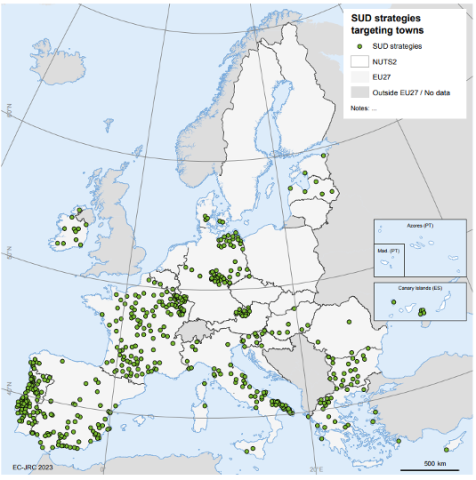Leveraging European funding for small urban areas: Key learnings
On Thursday 8 February, the Policy Learning Platform held a webinar on the topic of Leveraging European Funding for small urban areas. These Small urban areas, defined as towns with populations ranging from 5,000 to 50,000 inhabitants and densities surpassing 300 inhabitants per km², have long been overlooked by European policies. However, the Riga Declaration (2015) recognised their significance in achieving balanced territorial development and common European goals, advocating for their integration into the Urban Agenda for the EU.
Webinar recording
Watch the webinar recording below.
Webinar agenda
00:01:00 Introduction to the webinar by Arnault Morisson
00:13:49 Keynote speech by Carlotta Fioretti, European Urban Initiative Expert, Sevilla, Spain on Sustainable urban development for small urban areas
00:24:11 Q&A: How did you select the case studies? Were they based on their capacity to leverage European funding or initiatives?
00:25:24 Q&A: You mentioned that projects or programmes that small urban areas are choosing are less ambitious or less complex than bigger cities. Do you think it is a problem or perhaps a good thing to do?
00:27:09 Q&A: You mentioned they are choosing smaller projects, even if they are ERDF funded. Do you think that it is because of the co-finance that needs to be provided or because of the nature of the projects that are being financed?
00:28:55 Q&A: From the case studies you presented, is there one town that did very well? And if so, why?
00:30:40 Q&A: Regarding sustainable urban development strategies, their implementation is not evenly covering EU territories, is there a. reason?
00:32:07 Q&A: Do you think one of the main problems is the lack of capacity, expertise, skills, and knowledge?
00:33:20 Presentation by Andrés Caballero Quintana from the Municipality of Las Palmas, Spain on Las Palmas Cuidad del Mar (ECORIS3 project)
00:46:12 Q&A: When you started thinking about the strategy in 2010, were you thinking of the blue economy and blue growth because you were expecting funding opportunities on the European level?
00:48:20 Q&A: You mentioned you mix different funding, and said that this was difficult. How did you do that?
00:51:00 Presentation by Egons Spalans from Ventspils City Council, Latvia on the Ventspils Digital Centre (SKILLS+ project)
01:12:41 Q&A: What were the main challenges to building those science centres through those types of funding?
Panel discussion
01:14:03 Q&A: You outlined you have been using different types of funding. Is there any type of funding that worked particularly well? Or is there anything missing?
01:24:44 Q&A: Small urban areas often don't have the right capacities. Do you have any insight on how to raise this capacity?
Key learnings
From this webinar, we can highlight some key insights for local and regional policymakers:
Small urban areas exhibit remarkable diversity in typology and trends. With approximately 14,000 such areas across the EU, they accommodate a substantial 43% of the EU”s population.
Small urban areas confront a wide array of societal challenges, including an aging population, brain drain, climate change, digital transition, and socio-economic transformations. Addressing these challenges necessitates tailored policy solutions that are integrated and comprehensive.
Small urban areas can adopt different policy approaches to address place-based societal challenges, such as:
- Re-activating places for people and community,
- re-discovering uniqueness,
- re-connecting with nature for a sustainable future,
- re-inventing smart public services,
- re-imaging governance and partnerships.
Read more about the different policy approaches - Policy Atlas of Sustainable Urban Development for Small Urban Areas
There exists a promising window of opportunity for small urban areas to access European funding, particularly within the 2021-2027 programming period. Policy Objective 5, emphasising sustainable and integrated development across all territories, offers a cross-cutting framework to address the diverse needs and challenges of urban and non-urban areas.
Effective strategies tailored to small urban areas must be responsive to specific societal challenges. For instance, initiatives such as Las Palmas Ciudad del Mar in Spain, focusing on the blue economy, and the Ventspils Digital Centre (VDC) focused in Latvia, prioritising the development of digital skills and ICT infrastructure, exemplify targeted approaches.
Localisation of Sustainable Urban Development strategies targeting small urban areas:

The lack of capacities within small urban areas poses a significant obstacle to accessing European funding. To address this challenge, several strategies can be employed:
- Role of intermediaries: Regional development agencies and similar intermediaries can play a pivotal role in facilitating access to funding opportunities.
- Utilisation of EU initiatives: Small urban areas can benefit from EU capacity-building initiatives, including those offered by the Joint Research Centre (JRC), European Urban Initiatives, and Interreg Europe…
- Expertise acquisition: Hiring individuals with experience in EU projects and proposals can enhance the capacity of small urban areas to navigate complex funding processes.
To actively engage in European projects, small urban areas must:
- Maintain open and proactive top management
- Foster collaboration and break down silos within municipal teams
- Embrace ambition in goal-setting and implementation
- Prioritise communication and networking efforts
- Identify and leverage local competencies effectively
- Establish Key Performance Indicators (KPIs) to measure progress
- Involve citizens meaningfully in the project development and implementation processes
Presentations
Download the presentations below.
Have a look at our peer review on Gender Inclusive Urban Policies in Valenciennes, France.

